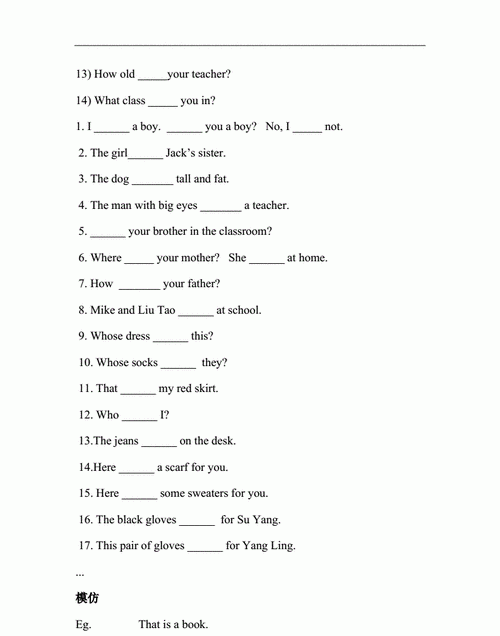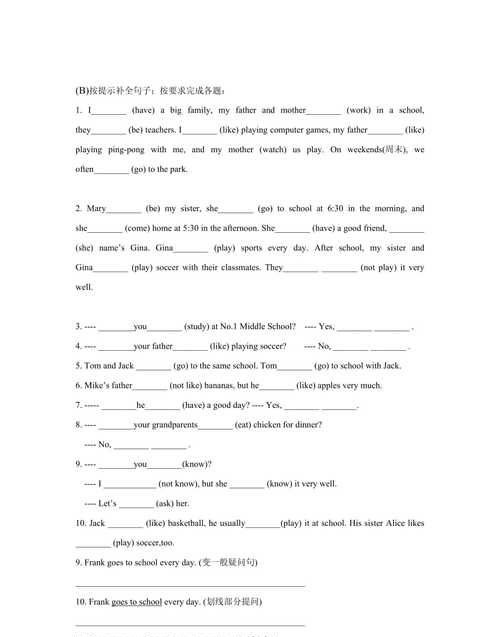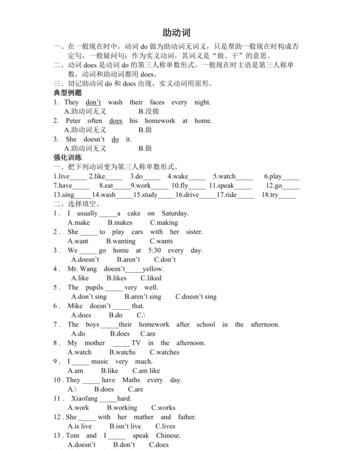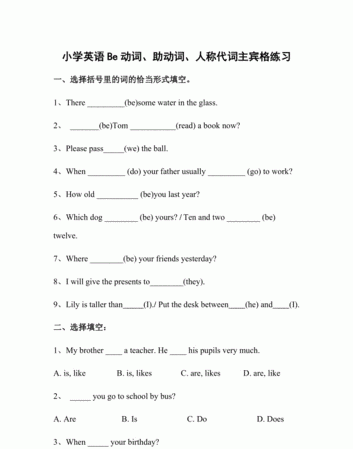本文目录
根据句意及首字母提示补全单词
小题1:goes 小题2:to drink 小题3:is watering 小题4:are made 小题5:will visit / am going to visit 小题6:was playing 小题7:has worked 小题8:speaking 小题9:must be kept 小题10:began |
试题分析: 小题1:句意:我爸爸很忙。他每天早上都很早去上班。根据every morning 可知该用一般现在时,he为第三人称单数,所以填写goes。 小题2:句意:医生经常告诉我们每天要多喝水。Tell sb to do sth告诉某人做某事。所以填写to drink。 小题3:句意:吉姆现在在哪里?他在花园里浇花。根据情景可知该用现在进行时态,所以填写is watering。 小题4:句意:中国毛笔是用竹子和动物的毛做的。Brushes是make这一动作的承受者,该用被动语态,所以填写are made。 小题5:句意:什么是你为即将到来的假期的计划呢?如果可能的话,我将参观北京。谈论计划做的事可用一般将来时,所以填写will visit / am going to visit。 小题6:句意:那个淘气的男孩在他妈妈进来时在玩电脑游戏。表示过去某一时间正在进行的动作用过去进行时,所以填写was playing。 小题7:句意:格林先生是个工程师。他在中国工作了两年。根据for about two years.可知用现在完成时态,所以填写has worked。 小题8:句意:他停了下来,房间里没有声音。Stop doing sth停止正在做的事,所以填写speaking。 小题9:句意:药必须远离儿童。根据句意可知该用带情态动词的被动语态,所以填写must be kept。 小题10:句意:杰克在两周前开始写一本关于他的旅行的书。由two weeks ago 知该用一般过去时,所以填写began。 |

动词填空共7小题及答案
【答案】【小题1】are
【小题2】eats
【小题3】have
【小题4】take
【小题5】watches
【小题6】doesn’t
have
【小题7】to
buy
【答案解析】试题分析:
【小题1】句意:我的朋友和我是同班同学。主语是my
friend
and
I,为复数,谓语也应该是复数are。
【小题2】句意:Alice每天上午吃一个香蕉。主语Alice是单数第三人称,谓语应该是单数第三人称,eats。
【小题3】句意:来和我一起吃午饭。and前后时态一致,故应该填have。
【小题4】句意:咱们拿那把蓝色的椅子。Let’s后面跟动词原形,故填动词原形take。
【小题5】句意:我的弟弟总是在晚上看电视。主语为my
brother,单数第三人称。谓语为第三人称单数watches。
【小题6】句意:她没有一个乒乓球拍。My
brother为单数第三人称,故助动词为does,故填doesn’t
have。
【小题7】句意:我想买一个棒球,但是体育用品商店在哪里?want后跟动词不定式,故填to
buy。
考点:单词填空。

小学英语be动词助动词情态动词讲解
以go为标准来添加字母
He __________to school by bus.
I usually ___________to school on foot.
以have为标准来添加字母
I __________a comic book.
she ______flower seeds.
I want to read some books.But I not____________books.
将be改成“is" "are" "am"选一个 例如:There (be)___are___ducks.
There (be)_____a apple ,two bananas.
I (be)_____a student.
现在进行时
I'm (do)___________the dishes.
将来进行时
where are you going this afternoon?
I'm going to the bookstore.
这就是将来进行时。

七年级上册be动词专练
【模拟试题】 一. 用括号中适当的词填空。 1. I ________(am, are, is) from Australia.
2. She _______ (am, are, is) a student.
3. Jane and Tom _________(am, is, are) my friends.
4. My parents _______ (am, is, are) very busy every day.
5. _______ (Are, Is, Do, Does) there a Chinese school in New York?
6. _______ (Be, Are, Were, Was) they excited when he heard the news?
7. There _____ (be) some glasses on it.
8. If he _____ (be) free tomorrow, he will go with us
. 二. 用所be动词的适当形式填空。
1. A: Where _______the post office. B: It ________ behind the building.
2. A: _______ you miss Black? B: Yes, I ______.
3. It _____ a shirt, it _______(not) a skirt.
4. There ________ a big playground in our school.
5. There ______ many books in my schoolbag.
6. There _________ some fish in the box.
7. _______ there any chairs in the classroom?
8. You’d better _______ early next time.
三. 仿照例句改写下列句子。
例句:She is in Class One, Grade Two. 否定句: She is not in Class One, Grade Two.
一般疑问句: Is she in Class One, Grade Two? 回答:Yes, she is. (No, she isn’t)
1. Bob is on the football team. 否定句: 一般疑问句: 回答:
2. They are in the teacher’s office. 否定句: 一般疑问句: 回答:
3. It is sunny today. 否定句: 一般疑问句: 回答:
4. There is some water in the bottle. 否定句: 一般疑问句: 回答:
5. There is a piano in the room. 否定句: 一般疑问句: 回答:
6. There are many trees in the school. 否定句: 一般疑问句: 回答:
7. There are four bottles of milk on the table. 否定句: 一般疑问句: 回答:
8. We are interested in painting. 否定句: 一般疑问句: 回答:
【试题答案】 一. 答案:1. am 2. is 3. are 4. are 5. Is 6. Were 7. are 8. is 二. 答案:1. is; is 2. Are; am 3. is; isn’t 4. is 5. are 6. is 7. Are 8. be 三. 答案: 1. 否定句:Bob isn’t on the football team. 一般疑问句: Is Bob on the football team? 回答:Yes, he is.( No, he isn’t.) 2. 否定句:They are not in the teacher’s office. 一般疑问句:Are they in the teacher’s office? 回答: Yes, they are. (No, they aren’t.) 3. 否定句: It is not sunny today. 一般疑问句:Is it sunny today? 回答:Yes, it is. (No, it isn’t.) 4. 否定句:There isn’t any water in the bottle. 一般疑问句:Is there any water in the bottle? 回答: Yes, there is. (No, there isn’t.) 5. 否定句: 一般疑问句:Is there a piano in the room? 回答:Yes, there is. (No, there isn’t.) 6. 否定句:There aren’t many trees in the school. 一般疑问句:Are there many trees in the school? 回答:Yes, there are. (No, there aren’t.) 7. 否定句:There are not four bottles of milk on the table. 一般疑问句:Are there four bottles of milk on the table? 回答:Yes, there are. (No, there aren’t) 8. 否定句:We aren’t interested in painting. 一般疑问句:Are you interested in painting?
1、be动词的用法。
be am / is are 现在时
was were 过去时
单数 复数
英语中,be动词选用单数还是复数,要由主语来定,主语是单数,就用单数,反之用复数。
◆ 句中含有be动词时:
肯定句: 主语+be + 其他
否定句: 主语+ be + not + 其他
一般疑问句: Be +主语+其他 +?
特殊疑问句: 疑问词(what / who / when / where) + be +主语 + 其他 +?
I am a teacher. You are right.
She is 16 years old. My father is at home.
The students are playing games. My teacher was ill yesterday.
There is a picture on the wall.
There are two books on the table.
★ be动词用法歌:
我用am,你用are,is 连接他她它。 单数名词用is,复数名词全用are。
变疑问,往前提,句末问号莫丢弃; 变否定,更容易,be后not莫忘记;
疑问否定任你变,句首大写莫迟疑。
★ be动词作谓语,它后面一般跟名词、形容词或介词短语。
2、助动词的用法。
英语句子按正常语序是“什么人或事物” + “做什么”,即,我们常说的“主语 + 谓语 + 其他”。
① 主语为I 或复数名词、代词时:
肯定句: I / We / They / The students + 动词原形 + 其他 + 。
We watch TV every night.
变否定: 主语+ don’t + 动词原形 + 其他 + 。
We don’t watch TV every night.
一般疑问句 Do + 主语 + 动词原形 + 其他 + ?
Do you watch TV every night?
Yes, we do. / No, we don’t.
特殊疑问句:疑问词 + do + 主语 + 动词原形 + 其他 + ?
How often do you watch TV?
② 主语为单数名词或代词时:
肯定句: 主语 + 动词第三人称单数形式 + 其他 + 。
He watches TV every night.
否定句: 主语+ doesn’t+动词原形+其他+。
He doesn’t watch TV every night.
一般疑问句:Does + 主语 + 动词原形 + 其他 + ?
Does he watch TV every night?
Yes, he does. / No, he doesn’t.
特殊疑问句:疑问词 + does + 主语 + 动词原形 + 其他 + ?
How often does he watch TV?
③ 过去时的句式(当句子时态为过去时时, 动词用过去式,不受主语单复数的影响)
肯定句: 主语 + 过去式 + 其他 + 。
He / We got up early every morning last year.
否定句: 主语 + didn’t + 动词原形 + 其他 + 。
He / We didn’t get up early every morning last year.
一般疑问句: Did + 主语 + 动词原形 + 其他 + ?
Did he / you get up early every morning last year?
Yes, he / we did. / No, he / we didn’t.
特殊疑问句: 疑问词 + did + 主语 + 动词原形 + 其他 + ?
When did he / you get up every morning last year?

以上就是关于助动词题目训练 小学,根据句意及首字母提示补全单词的全部内容,以及助动词题目 的相关内容,希望能够帮到您。
